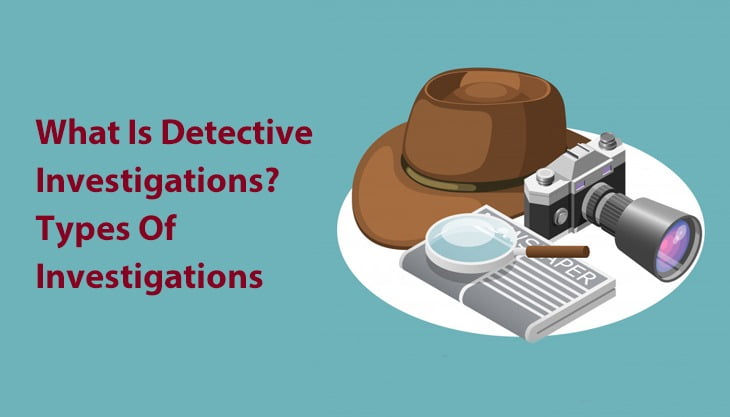Detective investigation is a branch of science that deals with the study of facts that are then used to inform criminal trials. A complete detective investigation can include interrogations, evidence collection & preservation, searching, interviews, and various types of investigation. Detective investigation, an ensemble of methods by which crimes are studied and criminals apprehend. The detectives seek to ascertain methods, motives and find criminals & victims.
What Is Detective Investigation?
Detective investigation is a multi-faced, problem-solving challenge. Arriving at the particular scene of a crime, an investigator needs to make a decision. After a crime scene is over, the investigator preserves the crime scene, collects proper evidence, and drafts an investigative plan that will lead to the forming of a situation to find and arrest the person or person solely responsible for the crime. A detective is an investigator, member of a law enforcement agency and they are experts in particular crimes including crime against persons, homicide, sex crimes, property crimes, or white-collar crimes. In general, detectives are members of law enforcement agencies and they collect information to solve crimes, talk to informants and witnesses, collect evidence and search records in databases. In the modern era, a private detective or detective agency is also commonly hired to complete investigations.
The Importance Of Detective Investigations
The responsibilities of a detective are different from how it is portrayed in films. Unlike fictional counterparts, their roles vary.
The importance of detective investigations are:
Finding and preserving evidence: detectives begin their investigation by walking through the scene of a crime and find what needs to be collected as evidence. Which evidence is important to make the case strong. They find the best way to gather the evidence without disturbing the rest of the crime scene. Using their skills, they can easily find clues and preserve them by sealing them in plastic bags or sterile containers to maintain their integrity.
Documenting evidence: Detectives document everything they collect at a particular crime scene and also they keep detailed records of what they find and in what situation they found it. They also take and preserve photographs of every aspect of the crime scene. Detectives make use of these records and photographs to reconstruct the crime. These records also play an important role in case a part of evidence gets lost or becomes damaged during the investigation process.
Collaborating with other law enforcement: with the help of proper investigation, you can also work along with other departments to know the truth.
Testifying in court: by conducting a proper investigation, you can collect evidence and prove it in court.
Types Of Investigations
Some of the types of investigation are:
Homicide: It is the type of investigation that is responsible for investigating the killing of one person by another. This type of investigation begins by assessing the scene of the incident such as photographing the scene, knowing the surrounding area for witnesses, collecting evidence, and dusting for fingerprints. The homicide investigators need to be experts at interviewing both suspects and witnesses to gather the required information.
Cybercrimes: In this digital era, most of the crimes happen in the digital medium or online. Some of the cyber crimes are illegal firearms sales, online harassment, online drug trafficking, and identify theft. Cybercrimes can be sometimes tricky to investigate because they often take place across different jurisdictions. Because it is difficult to find the suspect who hides behind their computer screen.
Forensic Investigations: There are several types of crimes that are investigated using forensics. The detectives in this special unit analyze evidence from crime scenes to find the real truth about what happened and who is responsible for the crime. They also deal with DNA evidence including hair or bodily fluids to find or eliminate possible suspects, and they use approaches like ballistics examination and soil analysis to recreate the exact scene of the crime.
Fraud: Fraud happens when someone uses false information to scam a person or business to earn money. There are many types of fraud some of them are credit card forgery, identity theft, insurance fraud, and more. Detectives use their skill set to collect evidence proving that fraud has occurred and file a case against them.
Family and sexual violence: This type of investigation is related to sexual assault, child abuse, domestic abuse, and other domestic violence. In general, these detectives interview victims and witnesses and collect forensic evidence to make a case against the perpetrator. Experts involved with these investigations may also work along with other organizations to support victims including counselors, social workers, and safer houses for women and children.
Crimes against Property: It is a wide category that involves the investigation of theft, vandalism, and burglary. Investigators in crimes against property cases may not have many leads to support them, particularly in situations where there were no witnesses.
Cold cases: These are unsolved cases that happened in the past. Some detectives dedicate their entire work to these cold cases, searching past evidence, finding new clues, and using advanced forensics technologies. Cold cases are reopened for detectives who are often related to crime including assault and homicide.
Narcotics: These detectives are mainly responsible for investigating cases related to drugs. These cases are drug sales, smuggling, the growing of drugs, production of drugs, and use of fraud to get prescription drugs illegally.
Gang Violence: This investigation focused on ending violence between gangs in a specific city. Some include overlap with narcotics cases, on the other hand, some of them include dealing with investigating offenders in gang-related crimes.
Conclusion
Now you have got the scoop on the types of investigations you could deal with as a detective investigator. You can hire a detective agency to investigate cases such as workplace violence, security evaluations, undercover operatives, cyber crimes, secret shoppers, background checks, surveillance, and witness locates.




as I website possessor I conceive the subject matter here is very excellent , thankyou for your efforts.